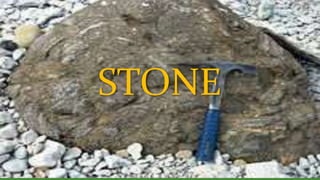stone by prayo
- 1. STONE
- 2. STONE • All The engineering Structures are made from some materials • These materials are know as engineering materials; building materials or materials of Construction . • No material, existing in the universe is useless. Every material has its own field of • application
- 3. Classification of rocks 1. Geological classification • 2. Physical classification • 3. Chemical classification • 4. Classification based on stone hardness:
- 4. Classification of rocks According to this classification stone may be classified As soft, medium, hard and very hard. -Very hard rocks as Granite, Trap and Taconite. -Hard rocks as Granite, Basalt, Gravel and Quartzite. - Medium rocks as Dolomite and Lime Stone. - Soft rocks as Talc, Gypsum and Sand stone.
- 5. Characteristics and qualities of good building stone : ÔÉòThe stone should be easily and economically obtainable in bulk . ÔÉòThe stone should be hard, strong and durable . ÔÉòIt should weather well. ÔÉòIt should have fine compact texture .
- 6. USES OF STONE 1.For masonry work 2.for lintels and vertical columns 3.for covering floors of building 4.for paving of roads and foot paths 5.As a covering material for buildings
- 7. 6.for the construction of roads in form of boulders and aggregate 7.as an aggregate in cement as well as lime concretes 8.Base material for water and sewage filters. 9.For the manufacture of cement and lime. 10.In the construction of masonry dams , stones of good quality and durability are of vital importance
- 8. TYPES OF STONE I. Basalt II. Gnesis III.Granite IV.Larterites V.Limestone VI.Marble VII.Sandstone VIII.Slate
- 9. Basalt Basalt with a vesicular or frothy texture is called scoria, and forms when dissolved gases are forced out of solution and form vesicles as the lava decompresses as it reaches the surface. Basalt is usually grey to black in colour Basalt almost always has a fine-grained mineral texture
- 10. TYPES Tholeiitic basalt is relatively rich in silica and poor in sodium MORB (Mid Ocean Ridge Basalt), is characteristically low in incompatible elements Alkali basalt is relatively poor in silica and rich in sodium • Uses • Basalt is used in construction (e.g. as building blocks or in the groundwork), making cobblestones (from columnar basalt) and in makingstatue. Heating and extruding basalt yields stone wool, said to be an excellent thermal insulator
- 12. GNEISS • Orthogneiss designates a gneiss derived from an igneous rock, and paragneiss is one from a sedimentary rock. Gneissose rocks have properties similar to gneiss. • The gneiss's delicate pink colours are exposed throughout the islands
- 14. Granite ÔÉòGranite is a common type of igneous rock ÔÉòGranites can be predominantly white, pink, or gray in color depending on their mineralogy. ÔÉòGranite has poor primary permeability but strong secondary permeability ÔÉòGranite has been extensively used as a dimension stone and as flooring tiles in public and commercial buildings and monuments ÔÉòPolished granite is also a popular choice for kitchen, countertops due to its high durability and aesthetic qualities
- 16. Limestone  Limestone is a sedimentary rock composed largely of the minerals calcite and aragonite, which are different crystal forms of calcium carbonate  Limestone is very common in architecture, especially in Europe and North America  So many buildings in Kingston, Ontario, Canada were constructed from it that it is nicknamed the 'Limestone City‘  Limestone was most popular in the late 19th and early 20th centuries. Train stations, banks and other structures from that era are normally made of limestone  . Many famous buildings in London are built from Portland limestone.
- 17. A limestone plate with a negative map of Moosburg in Bavaria is prepared for a lithography print. Courthouse built of limestone inManhattan, Kansas
- 18. Marble Marble is a non-foliated metamorphic rock Marble is commonly used for sculpture and as a building material. Construction marble is a stone which is composed of calcite, dolomite or serpentine which is capable of taking a polish. More generally in construction, specifically the dimension stone trade, the term "marble" is used for any crystalline calcitic rock
- 20. Sandstone oSandstone is a clastic sedimentary rock composed mainly of sand-sized minerals or rock grains. oSandstone was a popular building material from ancient times oIt is relatively soft, making it easy to carve. oIt has been widely used around the world in constructing temples, homes, and other buildings. It has also been used for artistic purposes to create ornamental fountains and statues. oSome sandstones are resistant to weathering, yet are easy to work. oThis makes sandstone a common building and paving material. osome types of sandstone are excellent materials from which to make grindstones, for sharpening blades and other implements. osome types of sandstone are excellent materials from which to make grindstones.
- 21. 17,000 years old sandstone oil lamp discovered at the caves of Lascaux, France. Sandstone doorway in Heidelberg,Germany Sandstone is highly absorbent. These are sandstone beverage coasters
- 22. Slate • Slate is a fine-grained, foliated, homogeneous metamorphic rock derived from an original shale-type sedimentary of clay or volcanic ash through low-grade. • Slate can be made into roofing slates, which are installed by • When broken, slate retains a natural appearance while relatively flat and easy to stack. • Slate is particularly suitable as a roofing material as it has an extremely low water absorption index of less than 0.4%, material waterproof. • . Natural slate is used by building professionals as a result of beauty and durability. • In areas where it is available, high-quality slate is used for tombstones.
- 23. Slate-faced church and homes in Wurzbach, Thüringen, Germany A grave with inscription on slate
- 24. slate roof tiles.Dharamsala, India.
- 25. THE END
























